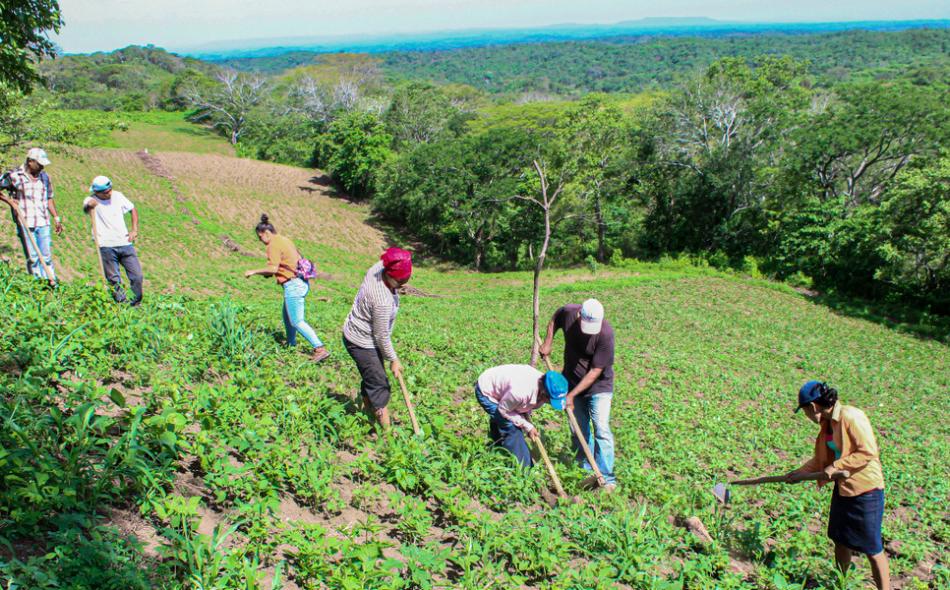The dominant food system in the world is exploitative and extractive, but examples across the world demonstrate that a more just and fair food system is possible. Agroecological approaches have evolved to offer a set of guiding principles that can help transform our food systems to create a more socially just, diverse, holistic and sustainable food system that better respects and benefits cultures, the environment and people engaged at every level of the system.
Agroecological approaches are anchored in human rights, rooted in culturally and ecologically diverse knowledge systems, and have the potential to build the community resilience necessary to deal with both the forces of climate change and corporate control. Yet, there have been roadblocks to advancing agroecology globally.
Agroecology experts, advocates and practitioners discussed how agroecology, as a systems approach, can address multiple ongoing global crises — ecological, economic and sociocultural. Farmers based in the Global North and South shared their reasons for practicing agroecology and the challenges they face. Panelists discussed these challenges, as well as potential pathways to successfully advancing agroecology. Panel presentations will be followed by a question-and-answer session where audience members will interact with the presenters and the panelists.
Agenda:
Agroecological approaches are anchored in human rights, rooted in culturally and ecologically diverse knowledge systems, and have the potential to build the community resilience necessary to deal with both the forces of climate change and corporate control. Yet, there have been roadblocks to advancing agroecology globally.
Agroecology experts, advocates and practitioners discussed how agroecology, as a systems approach, can address multiple ongoing global crises — ecological, economic and sociocultural. Farmers based in the Global North and South shared their reasons for practicing agroecology and the challenges they face. Panelists discussed these challenges, as well as potential pathways to successfully advancing agroecology. Panel presentations will be followed by a question-and-answer session where audience members will interact with the presenters and the panelists.
Agenda:
- Introduction: Agroecology: A systems approach for food system transformations
- Agroecology Today: Anchored in human rights; rooted in culturally and ecologically diverse knowledge systems; building resilience
- Panel I: Why do agroecological approaches offer the most comprehensive pathway to address multiple challenges and crises?
- Farmers Stories: Farmers from the Global North and South will share why they practice agroecology and challenges to success
- Panel II: Impediments and pathways to advancing agroecology around the world
Speakers
- Sophia Murphy, Executive Director, Institute for Agriculture and Trade Policy, USA
- Michel Pimbert, Director, Centre for Agroecology, Water and Resilience (CAWR), United Kingdom
- Lim Li Ching, Senior Researcher at Third World Network (TWN), Malaysia, and member of the International Panel of Experts on Sustainable Food Systems (IPES-Food)
- Marcia Ishii, Senior Scientist at Pesticide Action Network, North America (PANNA) and coordinator of the PAN International Agroecology Group
- Million Belay, General Coordinator, Alliance for Food Sovereignty Africa (AFSA), Ethiopia
"Food policy dialogues have been conducted in 24 African countries in before the UNFSS dialogues started. We are now working on a synthesis to influence the AU for an Africa food policy which has agroecology as its center"
"Covid-19 is also an opportunity to educate policy makers to demonstrate how nutritious African foods are" - Jim Goodman, Chairperson, National Family Farmers Coalition, USA
- Nina Moeller, Associate Professor, CAWR, U.K. and Agroecology Now!
- Timothy Wise, Senior Advisor, IATP, USA
"The research with African society organisations and faith communities has focused on the need to disrupt and redirect funding which goes to industrial agriculture"
"Our research has shown that AGRA and its green revolution approach has produced mediocre results. In the AGRA focus countries hunger has gone up with 13% and this is prior to COVID-19"
"It's difficult to open a lane in government (both the policy and funding lane) for agroecological approaches. The donors are not the biggest problem. African government themselves are purchasing huge amount of subsidies for green revolution inputs, commercial seeds and fertilizers.
"The government of Malawi in some years has spend 60% of its entire agricultural budget on seeds and fertilizers. Although those subsidies end up to benefit farmers they go directly to [seed and fertiliser] companies. They are the beneficiaries."
"Corporate concentration has increased. ITPA has supported AFSA to ask all agri-donors to end funding to green revolution programmes. We plan to direct our attention to our own government [US] and open a lane for agroecology" - Francesco Ajena, Independent Researcher, Italy
- Alberta Guerra, Senior Policy Analyst, Action Aid, USA/Italy
- Jason Lindsay, agroecology farmer, educator, Southeastern African American Farmers Organic Network, (SAAFON), USA
- Busisiwe Mgangxela, agroecology farmer, member of South African Organic Sector Organization (SAOSO), South Africa
- Vincent Delobel, Agroecological farmer, Member of the Mouvement d'Action Paysanne and of the FUGEA, Belgium
- Marcela Calderón, farmer in Buenos Aires province, Argentina
- Cecilia Elizondo, Academic Staff of Agroecology Group, El Colegio de La Frontera Sur and former Chief of Cabinet of Ministry of Environment and Natural Resources, Mexico
- Vincent Dauby, Agroecology and Food Sovereignty Officer, CIDSE, Belgium
- Shiney Varghese, Senior Policy Analyst, IATP, USA
- Moderator: Karen Hansen-Kuhn, Program Director, IATP, USA


No comments:
Post a Comment